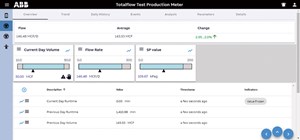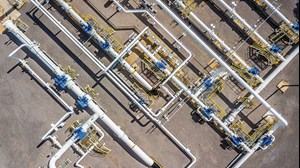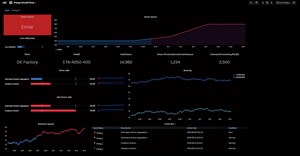Smaller operators benefit from cost-effective digital solution
The oil price collapse, which occurred in 2014–2015, put intense economic pressure on small and mid-sized onshore operators. To remain profitable, many companies attempted to improve operational efficiency by increasing production and reducing associated costs. To provide additional value, service providers focused on developing digital solutions to help achieve the goal. But in this fiscally challenging environment, producers must carefully balance the value of the technological solution against what is economically viable from an operational standpoint.
One facet of the operation that can be readily improved is reducing the number of wellsite visits made by field personnel. To further improve overall efficiency, it is imperative to capture the value and field experience of each pumper by fully leveraging the data, using technology that enables them to manage a larger number of wells. Most operators start small, with limited wells, but through acquisition and drilling new wells, their portfolio can grow quickly. These new wells must be worked without increasing operational costs to manage the additional production. While most companies have a degree of automation already installed within their operations, many do not have an integrated supervisory control and data acquisition (SCADA) network in place. To solve the issue, smaller and mid-sized companies required a cost-effective digital solution.
CLOUD-BASED SCADA

The answer is a scalable cloud-based oil-and-gas-focused production platform that uses proven SCADA technology and protocols to enable companies to change their workflows, to operate and produce by exception. Last year, ABB Energy Industries launched the ABB Ability Wellhead Manager, which overcomes the lack of network infrastructure by using cloud-based services to gather information about onshore upstream assets, Fig. 1. The system allows operators to gain insight into their production assets anywhere in the world, while enabling remote workers to connect in real time—supporting enhanced teamwork and productivity for optimal results.
The powerful solution addresses the core issues associated with minimizing operational costs, while providing a safe environment to reduce excessive travel to wellsites. For example, by providing immediate access to data, alarms and call-out notifications to mitigate downtime and reduce risk. In this way, companies can prevent issues proactively, predict productivity, and easily scale up or down, as required.
Working with Microsoft and their Azure Cloud, ABB has taken its traditional SCADA applications and converted them for cloud functions and databases, leveraging low-cost storage inside the cloud. This functionality has eliminated the need for installed software and moved it to a service computing model that Microsoft has rolled out for standard computer applications.
From a security standpoint, the new technology offers a clear advantage of a highly secure infrastructure and database. And because the information is updated constantly, there is no need to wait for an automation vendor to issue a software update. The move to a more agile development methodology enables users to roll-out new features in as little as three weeks. This gives operators the ability to move away from a compiled DVD, which can take between six months and a year to release.
Advanced technology for small and mid-sized operators. Because the ABB Ability Wellhead Platform utilizes IoT and related technologies, more operators can now extract critical production data from their wellheads. The system allows engineers to focus their full attention on solving inefficiencies by analyzing historical performance data and taking corrective actions to improve production and cut costs.
The open nature of the new system enables it to store data in Azure and serve as an overall platform, making it different from a pure SCADA host. There are multiple application programming interfaces (API) that are readily accessible to work with ABB, including the company’s Alarm Insight and Safety Insight portfolio, or third-party partner suppliers.

The way that the cloud functions is arranged in the architecture to also allow for scalable and flexible access. ABB has been in the SCADA business since the early 2000s, and has garnered extensive experience in the SCADA realm of the industrial protocols that operate a communication system. At the heart of this understanding are legacy industrial protocols to communicate with different field-level instrumentations that are operating on the wells.
After production data are gathered digitally, they are visualized, using a progressive web application. The platform offers clear dashboards, insights and analytics, Fig. 2. This is all at a cost that can be indexed to production, because the commercial model is a software-as-a-service (SaaS), which has no upfront expense. It changes the commercial vision and alignment to a much tighter business model, avoiding the hiring of additional staff and/or having large capital expenditures associated with a traditional surveillance system.
CASE STUDY

U.S. based IACX Energy recently acquired a gas gathering system in New Mexico and needed a SCADA platform to collect and compile measurement data from well instrumentation, Fig. 3. The company opted for ABB’s Ability Wellhead Manager platform as an alternative to a full-scale SCADA development. It was not just the ability to collect data that appealed to IACX, but the additional functionality that enables them to concurrently monitor transmission lines that led to the purchasing decision. ABB’s cloud-based system also automatically generates export files for the specific measurement platform installed on the gas gathering network.
The cloud-based automation system was set-up to monitor equipment in the field and notify IACX when problems arise, Fig. 4. Additionally, there are several points on the network where the company has installed new equipment for separation. To maintain the new installations, the system was adjusted to provide automatic call-outs, to keep the network onstream in the event of a disruption. Without this functionality, production could be negatively impacted. This functionality is crucial to ensure that the equipment is kept running, which is always a prime concern.

IACX Energy has the system running on 470 wells, but an additional project will add another 1,500 wells. During the initial implementation, IACX reported that the system was relatively simple to install and easy to keep operational. There were some database files in the first implementation that benefited significantly from a reduction in implementation time. Implementing the new system has been easier than expected, given the complexity of the network.
The future’s in the cloud. Operators need to pursue digitalization of their assets to automate their workflows, to maximize productivity and safety using IoT technology. ABB is focusing on several new systems that deliver automation platforms that can be utilized for simply collecting data, in additional to full-blown predictive solutions for operations and production.
Over the next six months, ABB will be enhancing the wellhead platform’s capabilities further to support the wider business needs of all operators. It will include management systems that will enable companies to visualize alarm KPIs and optimize operations. Severe weather geo alerts also will be added, notifying field and control room personnel of inclement weather conditions. A geofence command service will help improve field workflows by issuing automation commands when a user enters or leaves a geofence.
ABB also plans to add an ABB Ability Asset Performance Management technology, with prescriptive analytics for artificial lift and rotating equipment. Additional products will be embedded to improve production and reduce maintenance costs of plunger lift systems to optimization application parameters, and detect failures to improve overall production.
Energy companies are shifting their focus towards fewer new ventures within select basins, while working towards maximizing value from existing resources. As these companies embark on a path to optimize their operations, the digital wellhead, for many, offers the first step.
Given the rapid pace of innovation in analytics and cloud services, not to mention field devices, we will soon see even more options for wellhead digitalization over the coming years. The key to realizing returns and gaining competitive advantage is to start the digitalization journey now.
- Digital transformation/Late-life optimization: Harnessing data-driven strategies for late-life optimization (March 2024)
- The reserves replacement dilemma: Can intelligent digital technologies fill the supply gap? (March 2024)
- Digital tool kit enhances real-time decision-making to improve drilling efficiency and performance (February 2024)
- Digital transformation: Digital twins help to make the invisible, visible in Indonesia’s energy industry (January 2024)
- Digital transformation: A breakthrough year for digitalization in the offshore sector (January 2024)
- Quantum computing and subsurface prediction (January 2024)


